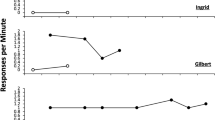Abstract
According to cultural materialism, cultural practices result from the materialistic outcomes of those practices, not from sociobiological, mentalistic, or mystical predispositions (e.g., Hindus worship cows because, in the long run, that worship results in more food, not less food). However, according to behavior analysis, such materialistic outcomes do not reinforce or punish the cultural practices, because such outcomes are too delayed, too improbable, or individually too small to directly reinforce or punish the cultural practices (e.g., the food increase is too delayed to reinforce the cow worship). Therefore, the molar, materialistic contingencies need the support of molecular, behavioral contingencies. And according to the present theory of rule-governed behavior, the statement of rules describing those molar, materialistic contingencies can establish the needed molecular contingencies. Given the proper behavioral history, such rule statements combine with noncompliance to produce a learned aversive condition (often labeled fear, anxiety, or guilt). The termination of this aversive condition reinforces compliance, just as its presentation punishes noncompliance (e.g., the termination of guilt reinforces the tending to a sick cow). In addition, supernatural rules often supplement these materialistic rules. Furthermore, the production of both materialistic and supernatural rules needs cultural designers who understand the molar, materialistic contingencies.
Similar content being viewed by others
References
English, H. B., & English, A. C. (1958). A comprehensive dictionary of psychological and psychoanalytic terms. New York: David McKay.
Glenn, S. S. (1986). Metacontingencies in Waiden Two. Behavior Analysis and Social Action, 5, 2–8.
Glenn, S. S. (1987). Rules as environmental events. The Analysis of Verbal Behavior, 5, 29–32.
Goodenough, W. H. (1970). Description and comparison in cultural anthropology. Chicago: Aldine.
Harris, M. (1974). Cows, pigs, wars and witches: The riddles of culture. New York: Random House.
Harris, M. (1980). Cultural materialism: The struggle for a science of culture. New York: Random House.
Harris, M. (1983). Cultural anthropology. New York: Harper & Row.
Harris, M. (1985). Good to eat. New York: Simon and Schuster.
Harris, M. (1986, May). Cultural materialism and behavior analysis: Common problems and radical solutions. Paper presented at the meeting of the Association for Behavior Analysis, Milwaukee, WI.
Harris, M. (1987, May). Discussant. In H. S. Pennypacker (Chair), Behavior analysis and cultural materialism. Symposium conducted at the meeting of the Association for Behavior Analysis, Nashville, TN.
Hefferline, R. F., Keenan, B., & Hartford, R. A. (1956). Escape and avoidance conditioning in human subjects without their observation of the responses. Science, 130, 1338–1339.
Lewin, A. (Producer), & Franklin, S. (Director). (1937). The good earth (Film). Hollywood: MGM/UA.
Lloyd, K. E. (1985). Behavioral anthropology: A review of Marvin Harris’ Cultural materialism. Journal of the Experimental Analysis of Behavior, 43, 279–287.
Lloyd, K. E. (1987). Emics and etics. In H. S. Pennypacker (Chair), Behavior analysis and cultural materialism. Symposium conducted at the meeting of the Association for Behavior Analysis, Nashville, TN.
Malagodi, E. F. (1986). On radicalizing behaviorism: A call for cultural analysis. The Behavior Analyst, 9, 1–17.
Malott, R. W. (1982, May). Skinner on issues relevant to rule-governed behavior. In M. E. Vaughan (Chair), On rule-governed behavior. Symposium conducted at the meeting of the Association for Behavior Analysis, Milwaukee, WI.
Malott, R. W. (1984). Rule-governed behavior, self-management, and the developmentally disabled: A theoretical analysis. Analysis and Intervention in Developmental Disabilities, 6, 53–58.
Malott, R. W. (1986). Self-management, rule-governed behavior, and everyday life. In H. W. Reese & L. J. Parrott (Eds.), Behavioral science: Philosophical, methodological, and empirical advances (pp. 207–228). Hillsdale, NJ: Lawrence Erlbaum.
Malott, R. W. (in press). The achievement of evasive goals: Control by rules describing contingencies that are not direct-acting. In S. Hayes (Ed.), Cognition, contingencies, and rule-governed behavior. New York: Plenum Press.
Malott, R. W., & Garcia, M. E. (in press). The role of private events in rule-governed behavior. In L. J. Hayes & P. N. Chase (Eds.), Dialogues on verbal behavior: Proceedings of the First International Institute on Verbal Relations. Hillsdale, NJ: Lawrence Erlbaum.
Malott, R. W., General, D. A., & Snapper, V. B. (1973). Issues in the analysis of behavior. Kalamazoo, MI: Behaviordelia.
Malott, R. W., & Kent, H. M. (1977). Developing moral control. In J. E. Krapfl & E. A. Vargas (Eds.), Behaviorism and ethics (pp. 49–62). Kalamazoo, MI: Behaviordelia.
Malott, R. W., & Whaley, D. L. (1976). Psychology. Holmes Beach, FL: Learning Publications.
Michael, J. (1982). Distinguishing between discriminative and motivational functions of stimuli. Journal of the Experimental Analysis of Behavior, 37, 149–155.
Michael, J. (1984). Behavior analysis: A radical perspective. In B. L. Hammonds & C. J. Scheirer (Eds.), Master lecture series, Volume 4: Psychology of learning (pp. 99–121). Washington, DC: American Psychological Association.
Michael, J. (1986). Repertoire-altering effects of remote contingencies. The Analysis of Verbal Behavior, 4, 10–18.
Skinner, B. F. (1945). The operational analysis of psychological terms. Psychological Review, 52, 270–277.
Skinner, B. F. (1948). Waiden Two. New York: Macmillan.
Skinner, B. F. (1953). Science and human behavior. New York: Macmillan.
Skinner, B. F. (1957). Verbal behavior. Englewood Cliffs, NJ: Prentice-Hall.
Skinner, B. F. (1969). Contingencies of reinforcement. Englewood Cliffs, NJ: Prentice-Hall.
Skinner, B. F. (1974). About behaviorism. New York: Vintage.
Stoutimore, M. (1986, May). Arranging for the analysis of cultural practices. Paper presented at the meeting of the Association for Behavior Analysis, Milwaukee, WI.
Vargas, E. A. (1985). Cultural contingencies: A review of Marvin Harris’s Cannibals and kings. Journal of the Experimental Analysis of Behavior, 43, 419–428.
Author information
Authors and Affiliations
Additional information
I completed this manuscript while on sabbatical leave as a visiting scholar in the Department of Psychology at the University of Victoria. I would like to thank Maria Emma Garcia, Joseph Parsons, and Ernest Vargas for their helpful feedback, based on earlier drafts of this article.
Rights and permissions
About this article
Cite this article
Malott, R.W. Rule-Governed Behavior and Behavioral Anthropology. BEHAV ANALYST 11, 181–203 (1988). https://doi.org/10.1007/BF03392471
Published:
Issue Date:
DOI: https://doi.org/10.1007/BF03392471




